Lawyers Reveal True Depth of Mental Health Struggles
ALM's latest Mental Health and Substance Abuse Survey shows that the problems of depression, anxiety and substance abuse among lawyers and legal professionals may be worse than realized. At the same time, more people in the profession seem open to addressing it.
February 19, 2020 at 11:00 AM
13 minute read

An overwhelming majority of legal professionals believe their mental well-being is worse off as a result of their chosen career, an in-depth survey of law firm lawyers and staff suggest.
ALM's Mental Health and Substance Abuse Survey found that 31.2% of the more than 3,800 respondents feel they are depressed, 64% feel they have anxiety, 10.1% feel they have an alcohol problem and 2.8% feel they have a drug problem.
See By the Numbers: The State of Mental Health in the Legal Industry for key data points from the survey.
Asked whether their work environment contributes to those mental health issues, 73% said yes.
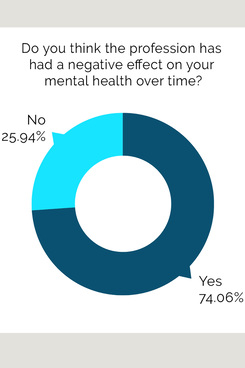 And nearly three-quarters of all respondents, 74%, said yes when asked "Do you think the profession has had a negative effect on your mental health over time?"
And nearly three-quarters of all respondents, 74%, said yes when asked "Do you think the profession has had a negative effect on your mental health over time?"
"I think that's a very significant finding and points to the fact that we're falling short of what we could be offering people," said Patrick Krill, an attorney, certified alcohol and drug counselor, and consultant to numerous law firms on mental health and substance abuse issues.
"At a high level, that is something that is going to repel people from the legal profession," Krill said.
The survey results shed light on life inside a law firm; how firm mental health programs are viewed; and the causes of mental health challenges in law firms.
About 41% of respondents said mental health problems and substance abuse are at a crisis level in the legal industry, while about 34% said they don't know and 25% said no. More than half of respondents, 56%, said mental health problems and substance abuse are worse in the legal industry than in other industries.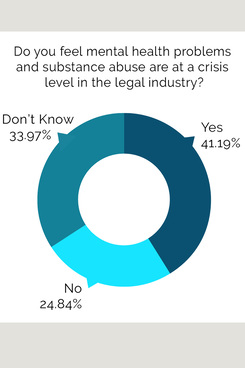
Other answers in the survey, which was conducted with ALM Intelligence in conjunction with Law.com's Minds Over Matters project, show that it is, in fact, a crisis, said Lisa F. Smith, a lawyer who wrote about her own experience with addiction and recovery in her memoir, "Girl Walks Out of A Bar," and frequently speaks about mental health and substance abuse at other law firms.
"The numbers are off the charts. It shows us that we're still at crisis level in the profession on all these issues," Smith said. She noted that since 2016, when the American Bar Association and Hazelden Betty Ford Foundation released their study on attorney substance abuse and mental health, conversation has opened up and stigma surrounding those discussions has dissipated some.
"People are answering these things more honestly than they did in the past," Smith said.
Krill, who was the lead author of that 2016 study, agreed that the conversation has changed in the four years since. "If you're able to really go back and put yourself in 2015, this is just not a conversation law firms were having. They were not acknowledging these issues," he said.
ALM's survey, conducted for the first time in 2019, asked participants about their own mental health in general and as it relates to their work in the law firm, as well as observations about mental health at their firms and in the legal industry on the whole.
Nearly one-third of respondents said they have increased their use of drugs or alcohol as a result of their work or work environment. Asked how they deal with stress, 44.4% said they drink alcohol and nearly 4% said they use illegal drugs or abuse prescription drugs.
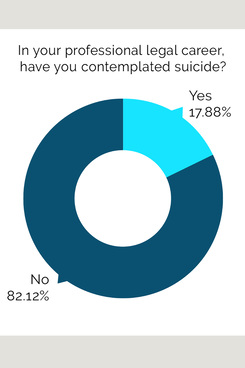 More than one in six respondents—17.9%—said they have contemplated suicide during their professional legal career.
More than one in six respondents—17.9%—said they have contemplated suicide during their professional legal career.
That number is "astounding," Krill said, as it's nearly double the lifetime rate of suicidal ideation in the general population. According to data from the NIH, 4.3% of adults in the United States had thoughts about suicide in 2017.
Krill and other mental health professionals with legal industry ties noted that in any survey, no matter how carefully administered, respondents may not effectively self-diagnose mental health issues, and are likely to under-report their use or abuse of drugs and alcohol. Still, they said, the numbers in this most recent survey suggest that people in the legal industry are discussing mental health and substance abuse issues more openly.
And, they noted, some of the answers to ALM's survey suggest the industry still needs more education about mental health and what constitutes substance abuse.
For instance, Robin Belleau, firmwide director of well-being at Kirkland & Ellis, noted the difference between the 10% of people who said they have an alcohol problem and the 32.7% who said they have increased their use of drugs or alcohol as a result of their work.
"I do think people can say, 'Yes, I have increased my use of drugs or alcohol because of where I work, but I still don't think it's a problem,' " she said. "As a clinician I would say if you are increasing your use of drugs or alcohol because of anything, that's a reason to step back and evaluate your use."
Why the Legal Industry Is Different
Asked what about their job negatively impacts their mental well-being, respondents identified a number of factors. Most popular among those factors, capturing a majority of respondents, were: the feeling of always being on call and unable to disconnect; billable hour pressures; lack of sleep; and client demands.
Only 36% of respondents said they use all of their vacation time. The others, asked why they do not, most commonly answered that they "can't disconnect" and that "client demands" keep them from doing so, or that they "don't want to have work pile up."
Even when they do take vacation, 72.5% said they cannot disconnect from work during that time.
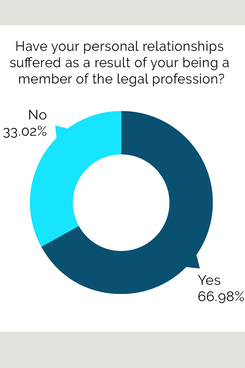 "How many lawyers sleep more than an arm's length away from their [smartphone] device?" Smith wondered. She noted that when she was coming up as an associate, while the law firm environment was certainly challenging, lawyers could at least feel less tethered once they had stepped out of the office because there were fewer ways to keep tabs on ongoing situations from outside the firm walls.
"How many lawyers sleep more than an arm's length away from their [smartphone] device?" Smith wondered. She noted that when she was coming up as an associate, while the law firm environment was certainly challenging, lawyers could at least feel less tethered once they had stepped out of the office because there were fewer ways to keep tabs on ongoing situations from outside the firm walls.
And that feeling of being constantly on call can have far-reaching consequences.
"Because you can't disconnect, when you see a small window, like when the partner signs out for the night, you've got a very small window to relax," Smith said. "And nothing takes you from 60 to zero as quickly as a drink or a pill."
Others also noted the role of constant availability in mental health issues, both in the legal industry and more broadly. The technology comes with some benefits, like the ability to work remotely and manage family responsibilities at home, but also with unintended consequences.
Anne Brafford, a former equity partner at Morgan, Lewis & Bockius whose consulting firm Aspire focuses on well-being issues, noted that some organizations, mainly outside the legal industry, have created rules against emailing outside work hours unless it's an emergency.
 "Before we had text and email, we had to be in the office, and that wasn't good either," said Brafford. "It's obviously an area that's grown beyond our ability to manage it. We just started using it because it was new and there were so many good things about it."
"Before we had text and email, we had to be in the office, and that wasn't good either," said Brafford. "It's obviously an area that's grown beyond our ability to manage it. We just started using it because it was new and there were so many good things about it."
As for billable hour requirements, Brafford said, she wasn't surprised to see them as a major contributor to respondents' well-being challenges. She said there's a key distinction between working long hours and being held to high billable hour requirements, citing a 2015 study by Lawrence Krieger and Kennon Sheldon.
"It's being controlled, and feeling like we have to work these hours because it's required," versus devoting many hours to a case or client matter because it is important work, Brafford said. "I think law firm leaders don't necessarily love this model, but no one has found a better way of doing it yet."
Still, she noted, leaders within the legal industry are loath to pinpoint the billable hour as a central issue. When she brings it up, they tune out.
"The conversation has to start somewhere, and right now it's not happening at law firms," Brafford said.
Digging Down to the Roots
Smith, Krill, Belleau and Brafford all said law firms seem to be taking important steps toward improving mental health within their organizations, but the work has only just begun. They pointed to a noticeable change in the level of conversation around mental health, and to the fact that many law firms have changed their social and team-building events so they're not centered around drinking alcohol.
"They're making steps, it's just that we haven't gotten to that point of addressing the root causes," Krill said.
And many survey respondents are still unaware of what their firms are doing to address mental health issues and substance abuse.
In a section of the survey that asked about mental health resources at law firms, more than half of respondents said their firms provide an employee assistance program that includes help for mental health or substance abuse, and over half said their firms' benefits packages support mental health and substance abuse treatment and recovery.
But more than 35% of respondents didn't know whether their firms offer those benefits.
Smith pointed out that even if a law firm, as the employer, includes mental health coverage in its benefits, people are often limited in actually using them if networks or benefits are limited. That could make the difference between a lawyer seeking help or not, and it's a matter of law firms having better discussions with their insurance providers.
Beyond health care benefits, it seems many law firm professionals are unsure where their employers stand.
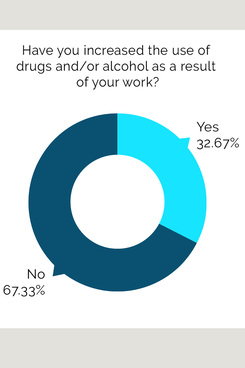 When asked whether their firms have certain other procedures and programs in place to support good mental health, more respondents answered "don't know" than "yes." For instance, more than two-thirds said they don't know if their firm has "a crisis protocol that explains how employees can safely report if they believe a coworker has a problem with mental health or substance abuse/addiction issues."
When asked whether their firms have certain other procedures and programs in place to support good mental health, more respondents answered "don't know" than "yes." For instance, more than two-thirds said they don't know if their firm has "a crisis protocol that explains how employees can safely report if they believe a coworker has a problem with mental health or substance abuse/addiction issues."
Asked whether their firms have a wellness professional on-site, 13.8% said yes. More than half said they don't know.
Asked if they feel they could take extended leave to address mental health or substance abuse issues, 35% said yes. Of the 65% who said no, 78% said it would hurt their career trajectory, 77% said they fear what the firm would think, and 36% said they fear what clients would think. Respondents could give multiple reasons, and 56% said there's simply too much work to take an extended leave.
Still, the majority of respondents, 60.6%, said their firm's concern for lawyer and staff mental health seems sincere.
Belleau said much of the conversation now is about wellness as a preventative measure, but that's ignoring a pressing issue.
"They also need to be talking about there are people already who have mental health issues, or are suicidal. Some of the programming out there is so geared toward wellness that they're not having these conversations."
More generally, Brafford said, firms need to not only have explicit policies and resources, but lawyers and staff need to know those aren't just "window dressing."
That largely comes down to leadership buy-in, Krill said. "You can't solve a problem with the same thinking that created it."
Making improvements to the current state of the profession will require more than conversations about what individuals are experiencing, Brafford said. While it starts there, the next step is reforming organizations—namely, law firms. And ultimately, the whole profession will be on the table, down to the courts and judicial system, she said.
"The fact that there's growing attention to the issue is a fantastic development," Brafford said. But "we're still in the early enough stages of what I think is going to be transformational change across the profession."
Methodology
The Mental Health and Substance Abuse survey, conducted by ALM Intelligence and Law.com, was sent to lawyers and professionals at the Global 200, Am Law 200 and NLJ 500 law firms. It was open to anyone working in a law firm setting anywhere around the world. The results are based on the more than 3,800 responses received during the survey period that took place over the last two months of 2019. More than 72% of respondents were in the United States, with the next largest grouping coming from the U.K. More than half of the respondents were at firms of 500 lawyers or more. The large majority of respondents were lawyers, with the largest group among them being associates. More information on the demographics will appear in follow-up articles breaking down the results by those demographics.
Read more — Minds Over Matters: An Examination of Mental Health in the Legal Profession
This content has been archived. It is available through our partners, LexisNexis® and Bloomberg Law.
To view this content, please continue to their sites.
Not a Lexis Subscriber?
Subscribe Now
Not a Bloomberg Law Subscriber?
Subscribe Now
NOT FOR REPRINT
© 2025 ALM Global, LLC, All Rights Reserved. Request academic re-use from www.copyright.com. All other uses, submit a request to asset-and-logo-licensing@alm.com. For more information visit Asset & Logo Licensing.
You Might Like
View All

More than Half of South Australian Lawyers Report Suffering Harassment
3 minute read
King & Spalding, Weil, Gotshal & Manges Launch Pro Bono Legal Initiative for Tennis Players
2 minute read
Trump Ordered to Pay Legal Bill Within 28 Days After Rejecting Costs Order
2 minute readLaw Firms Mentioned
Trending Stories
- 1Attorneys ‘On the Move’: O’Melveny Hires Former NBA Vice President; MoFo Adds Venture Capital Partner
- 2'Skin in the Game': Lawyers Call for Pressure After American Airlines Crash
- 3Apple Files Appeal to DC Circuit Aiming to Intervene in Google Search Monopoly Case
- 4A Plan Is Brewing to Limit Big-Dollar Suits in Georgia—and Lawyers Have Mixed Feelings
- 5Startup Bringing AI to Doctors' Offices Hires First GC
Who Got The Work
J. Brugh Lower of Gibbons has entered an appearance for industrial equipment supplier Devco Corporation in a pending trademark infringement lawsuit. The suit, accusing the defendant of selling knock-off Graco products, was filed Dec. 18 in New Jersey District Court by Rivkin Radler on behalf of Graco Inc. and Graco Minnesota. The case, assigned to U.S. District Judge Zahid N. Quraishi, is 3:24-cv-11294, Graco Inc. et al v. Devco Corporation.
Who Got The Work
Rebecca Maller-Stein and Kent A. Yalowitz of Arnold & Porter Kaye Scholer have entered their appearances for Hanaco Venture Capital and its executives, Lior Prosor and David Frankel, in a pending securities lawsuit. The action, filed on Dec. 24 in New York Southern District Court by Zell, Aron & Co. on behalf of Goldeneye Advisors, accuses the defendants of negligently and fraudulently managing the plaintiff's $1 million investment. The case, assigned to U.S. District Judge Vernon S. Broderick, is 1:24-cv-09918, Goldeneye Advisors, LLC v. Hanaco Venture Capital, Ltd. et al.
Who Got The Work
Attorneys from A&O Shearman has stepped in as defense counsel for Toronto-Dominion Bank and other defendants in a pending securities class action. The suit, filed Dec. 11 in New York Southern District Court by Bleichmar Fonti & Auld, accuses the defendants of concealing the bank's 'pervasive' deficiencies in regards to its compliance with the Bank Secrecy Act and the quality of its anti-money laundering controls. The case, assigned to U.S. District Judge Arun Subramanian, is 1:24-cv-09445, Gonzalez v. The Toronto-Dominion Bank et al.
Who Got The Work
Crown Castle International, a Pennsylvania company providing shared communications infrastructure, has turned to Luke D. Wolf of Gordon Rees Scully Mansukhani to fend off a pending breach-of-contract lawsuit. The court action, filed Nov. 25 in Michigan Eastern District Court by Hooper Hathaway PC on behalf of The Town Residences LLC, accuses Crown Castle of failing to transfer approximately $30,000 in utility payments from T-Mobile in breach of a roof-top lease and assignment agreement. The case, assigned to U.S. District Judge Susan K. Declercq, is 2:24-cv-13131, The Town Residences LLC v. T-Mobile US, Inc. et al.
Who Got The Work
Wilfred P. Coronato and Daniel M. Schwartz of McCarter & English have stepped in as defense counsel to Electrolux Home Products Inc. in a pending product liability lawsuit. The court action, filed Nov. 26 in New York Eastern District Court by Poulos Lopiccolo PC and Nagel Rice LLP on behalf of David Stern, alleges that the defendant's refrigerators’ drawers and shelving repeatedly break and fall apart within months after purchase. The case, assigned to U.S. District Judge Joan M. Azrack, is 2:24-cv-08204, Stern v. Electrolux Home Products, Inc.
Featured Firms
Law Offices of Gary Martin Hays & Associates, P.C.
(470) 294-1674
Law Offices of Mark E. Salomone
(857) 444-6468
Smith & Hassler
(713) 739-1250








